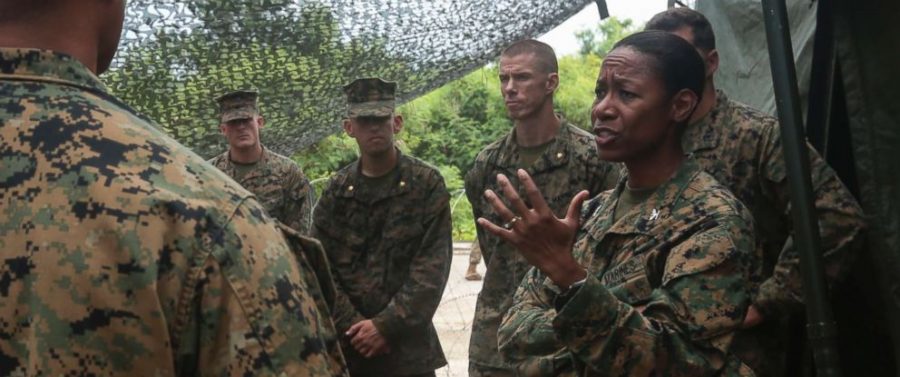Col. Lorna Mahlock of the United States Marine Corps, who graduated from Marquette in 1991, was nominated April 10 by President Donald Trump for brigadier general.
Mahlock served over 30 years in the Marine Corps. She is currently the deputy director of Operations, Plans, Policies and Operations Directorate in Washington, D.C. If elected, Mahlock will be the first African-American female to hold the position of brigadier general.
“I think females, especially who join the Marine Corps, are the type of females who know they don’t have limitations on what they do,” Georgi Llanas, a senior in the College of Arts & Sciences, said. Midshipman (MIDN) Llanas serves as Marine Option Platoon Commander for Marquette’s Naval Reserve Officers’ Training Corps.
MIDN Madison Abell, a junior in the College of Arts & Sciences, said if Mahlock is elected, she will either work under someone higher in the chain of command, or she will take a command position of a marine expedition or a unit force.
Promotions are made based on officers potential to carry out responsibilities and tasks of the next higher grade. Promotions do not serve as awards for past work and performances but as an incentive to excel in the next grade.
Brigadier general is a one-star rank, and it is the position below the major general.
“What I think is really important with the nomination of Mahlock is that she represents not just women in the military — she represents black women in the military,” Maria Bunczak, sophomore in the College of Nursing and president of Marquette Empowerment, said.
Bunczak said the nomination represents an intersectional issue because there are not that many women in the military.
Women in the Marines are the lowest percentage of females in a military force. 7.6 percent of women make up the Marine force, according to a 2015 “Time Labs” report.
Bunczak said it’s great for young girls, and kids in general, to see someone who looks like them so highly ranked.
“Whenever there are positions that have just been open like this to women, there is going to be bumps in the road, but there are going to be pioneers like Mahlock who we will look back on and look up to forever,” Bunczak said.
Llanas said Marine PFTs, physical fitness tests, are arguably more challenging than any other service — a reason why females may only make up a small percentage. Marines’ PFTs include a three-mile run, push-ups and sit-ups, along with a combat test which consists of sprints, maneuvers under fire, throwing a grenade and buddy-carrying someone over your shoulders.
“Physically, it’s very demanding. It’s stressful,” Llanas said.
Llanas grew up with Marines her entire life, and she said Marines are her favorite people. She said the organization has lasted as well as it has because of the people who are in it.
“There’s a type of person who gravitates toward the Marine Corps. If you talk to them, they’re very honest. They’re very blunt. They desire challenge. It’s very difficult to try and replicate that,” Llanas said.
“There is a certain type of ethos that is commanded by the Marine Corps,” Abell said.
Llanas said more and more females are starting to realize they don’t have limitations.
“Society might put it on you, but I think Marines kind of surround themselves with people who push each other. I see it as just progressing. I see it as exponential,” Llanas said.
When reached for comment from Mahlock, the public affairs officer from the Department of Defense said Mahlock is out of the country and therefore unable to comment.







John • May 3, 2018 at 2:29 pm
The PFT consists of pull ups. Push ups are a secondary option to pull ups if an individual cannot fulfill the minimum pull up requirement for their age and gender.